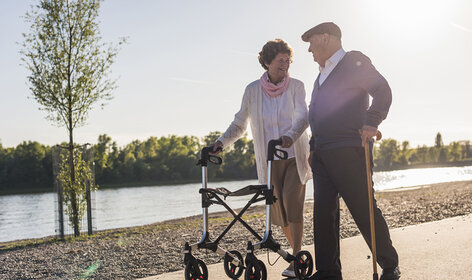"Without antibiotics, any infection can become life-threatening"
Infectiology(11.11.2025) The Medical Center - University of Freiburg is one of the three university hospitals with the lowest use of antibiotics in Germany. Global week of action from November 18, 2025: Appeal to physicians and the population: Use antibiotics in a targeted manner, avoid resistance.
Without effective antibiotics, routine operations become risky, births dangerous and many cancers almost impossible to treat. Antibiotic resistance is already proving fatal: in 2019, around 45,000 deaths in Germany were linked to multi-resistant pathogens. Infectiologists at the Medical Center - University of Freiburg are therefore appealing to everyone to help stop this development; physicians by prescribing the right antibiotics, patients by taking them correctly and dealing with infections responsibly. At the Medical Center - University of Freiburg, the use of antibiotics has been further optimized in recent years through targeted measures - with increased treatment quality.

"Antibiotics are a medical treasure and we will lose it if we use them carelessly," warns Prof. Dr. Siegbert Rieg. (c)Freepik
Without antibiotics, any infection can become life-threatening
The World Health Organization (WHO) is also drawing attention to this issue with its "World Antimicrobial Resistance Awareness Week" from 18 to 22 November 2025.
"Without antibiotics, any infection can become life-threatening. Antibiotics are a medical treasure and we lose it if we use them carelessly," warns Prof. Dr. Siegbert Rieg, Head of the Department of Infectious Diseases at the Department of Medicine II at the Medical Center - University of Freiburg. "At the same time, however, we also know that many antibiotic treatments are avoidable and that any unnecessary or incorrectly dosed administration promotes resistance," says Rieg.
Bucking the trend: fewer antibiotics in Freiburg thanks to dedicated advice
For over 15 years, the Medical Center - University of Freiburg has been involved in the targeted control of antibiotic use, known as antibiotic stewardship. Uniklinik Freiburg is one of the three university hospitals in Germany with the lowest antibiotic consumption.
Activities have been expanded even further since 2023. Specialized teams advise physicians at the University Medical Center in around 3,000 treatment cases per year on the selection, dosage and duration of antibiotic therapies, check microbiological findings and promote early switching from intravenous to oral treatment. In addition, more advanced training is being offered and antibiotic consumption is being pooled in a digital dashboard in pilot projects.
"This has enabled us to reduce the amount of antibiotics used at the Medical Center - University of Freiburg by 1.7 percent since 2023, compared to a nationwide increase of three percent in the same period," says Rieg. "This is good for patients and leads to reduced antibiotic costs. In the long term, it helps to prevent and contain resistance," says Rieg.
Antibiotics are often used incorrectly
International studies show that around 30 percent of all antibiotic treatments worldwide do not comply with recommendations. Therapies are often administered for illnesses that are not caused by bacteria, or antibiotics are prescribed for too long or with too broad a spectrum of activity. A study conducted by Freiburg infectiologists in German hospitals in 2024 shows that education and structured programs, such as those developed in Freiburg, can significantly reduce the number of unnecessary prescriptions. "The development that we are already seeing here is easily transferable to other hospitals," says Rieg.
What everyone can do
According to Rieg, it is often routine or uncertainty that leads to wrong decisions. This makes advanced training, sharing experiences and raising awareness all the more important - in hospitals, practices and the general public.
The following simple tips can already help a lot:
- Colds are almost always viral - antibiotics do not help here.
- Vaccinations reduce infections and therefore the need for antibiotics.
- Good hand hygiene and wearing a mask when symptoms occur protect others.
- Medical recommendations on the duration and dosage of antibiotics should be followed consistently.
More interesting articles
Medical Center - University of Freiburg
Central InformationPhone: 0761 270-0
info@uniklinik-freiburg.de
Corporate Communications
Breisacher Straße 15379110 Freiburg
Phone: 0761 270-84830
kommunikation@uniklinik-freiburg.de


